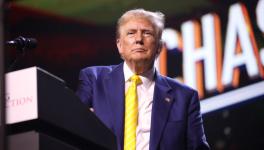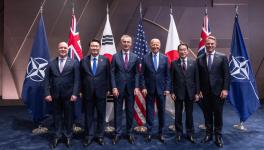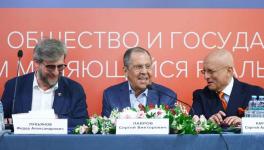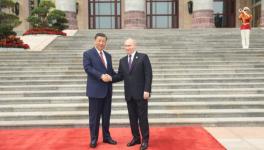In Ukraine, it’s Patriot vs. Iskander For Now
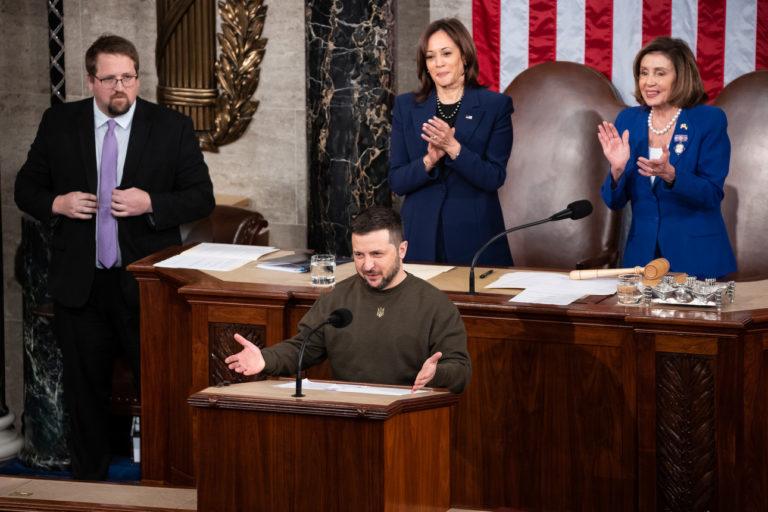
Ukraine President Vladimir Zelensky addressed a joint session of the US Congress, Washington, DC, December 21, 2022
With the Republicans poised to take narrow control of the House of Representatives in the US Congress in January, the Joe Biden Administration is hoping to extract as much funding as possible for the proxy war in Ukraine against Russia before the locus of legislative business shifts on the Hill. The White House is requesting nearly $45 billion in new funding. Who else could canvass better than an accomplished actor-politician?
Enter President Vladimir Zelensky. When Zelensky proposed on Sunday that he’d find time to visit Washington for a few hours on Wednesday, President Biden promptly accepted. For Zelensky too, it pays to be seen holding Biden’s hands amidst swirling rumours of a power struggle in Kiev.
To be sure, from the strategic perspective, the backdrop of Zelensky’s decision to travel to Washington urgently would have been the one-day trip by Russian President Vladimir Putin to Minsk on Monday, which shook up the geopolitics of European security. The Kremlin’s decision to provide Belarus with a nuclear deterrent puts Kiev and Washington on notice. (See my blog NATO nuclear compass rendered unavailing.)
Succinctly put, Belarus gets just the firewall needed to continue to support Russia’s special military operation in Ukraine. It serves a vital purpose for Moscow too, as Belarus gives just the strategic depth needed for the next phase of Russia’s special military operations in Ukraine.
In particular, NATO’s dreams of fortifying the Suwalki Gap and cutting off the massive nuclear base of Kaliningrad on the Baltic Sea from Belarus and the Russian hinterland have crashed. Indeed, post-Cold War history is changing course in the Eurasian landmass.
In effect, Moscow may have signalled that the Anglo-American strategy to equip Ukraine steadily and stealthily to hit deep inside Russian territory will not go unanswered. In fact, on Monday, Belarus President Alexander Lukashenko declared that the S-400 and Iskander missile systems supplied by Russia have been deployed on combat duty.
Iskander is a unique mobile ballistic missile system with modern precision strike capability, with a range of 400 km, and is nuclear-capable. It is connected to a networked system of sensors and prompt strike missiles capable of attacking targets across the theatre at very short notice.
Iskander is capable of manoeuvring at high terminal phase speeds of 2.1 km/s, equipped with jammers to counter active seekers and is a useful means of having a functionality against moving targets as well as for striking significant stationary targets, including headquarters, industrial production facilities, critical civilian national infrastructure, and hardened storage sites.
At a strategic level, the Iskander system is likely to be central to any Russian attempt at escalation management and war termination in Ukraine. Evidently, Russia is preparing for all eventualities.
On the other hand, Biden was at his rhetorical best, with Zelensky by his side in the White House, flinging vituperative epithets at Putin, and repeating Washington’s triumphalist narrative that the US will support Ukraine “for as long as it takes.”
However, life is real and rhetoric seldom translates into reality in politics. The tea leaves need to be read carefully. A senior White House official while confirming in unattributed media briefing on Tuesday that Patriot missiles are on their way to Ukraine, also added the caveat that it will be months before the Patriot missiles arrive in Ukraine, along with the “several months” needed to train Ukrainian armed forces to field it.
The official said that the Pentagon “will train Ukrainians in a third country to operate that battery. Once trained, they will go in with the battery to man it in Ukraine; it won’t be US personnel who are doing that. And nothing will change in that regard… [we] are not seeking to engage in a direct war with Russia. And nothing about that will change tomorrow.”
Clearly, that was an attempt to reduce the hype, as it were. Moscow had warned that if the US went ahead to supply Patriot to Ukraine, there would be “consequences” and Russian forces could target it.
Elsewhere, the US official also reaffirmed that “President [Biden] has been very clear from the beginning. He hasn’t wavered from and he won’t waver from it tomorrow, or next month or next year, that the United States is not sending forces to Ukraine to directly fight the Russians.”
At the core of the Zelensky visit is the Biden Administration’s urgent need to shore up “bipartisan” and “bicameral” support in the Congress for additional $45 billion in funding for Ukraine.
That said, when asked pointedly at the White House joint press conference with Zelensky about providing Ukraine with long-range missiles that could strike Russia, Biden starkly admitted, “The idea that we would give Ukraine material that is fundamentally different than what’s already going there would have a prospect of breaking up NATO, and breaking up the European Union, and the rest of the world… [US’ allies] don’t want to start a third world war…
“I’ve spent several hundred hours face-to-face with our European allies and the heads of state of those countries, and making the case as to why it was overwhelmingly in their interest that they continue to support Ukraine. They understand it fully, but they’re not looking to go to war with Russia. They’re not looking for a third World War.”
Now, this is an extraordinary statement at this point in time. It is tantamount to an olive branch to Moscow that the US does not want to climb the escalation ladder. In turn, it gives an intriguing look to the Zelensky visit to the US.
Indeed, although Zelensky’s trip to Washington was choreographed as a strategic show of unity, the fault lines cannot be glossed over — a lurking fear that the backing for Kiev could wane as fighting drags on. Simply put, the case that US assistance to Ukraine should not be a “blank check” can only gather momentum in the Congress.
Biden anticipates that the Ukraine conflict will figure as a campaign issue in 2024, and questions will arise. As The Hill wrote, “The skeptics contend that the US has no vital interests at stake in Ukraine, the gush of money toward Kiev is excessive and polluted by corruption, and the war is a distraction from the plethora of problems at home that demand attention.”
Equally, the angst in the European mind is palpable that the Anglo-Saxon commentariat and northern and eastern European politicians are imposing their agenda. Significantly, German President Frank-Walter Steinmeier, an experienced diplomat, had a call with Chinese President Xi Jinping on Tuesday coinciding with Zelensky’s journey to Washington.
The Chinese readout highlighted that while exchanging views on Ukraine, Xi voiced support for the EU “in demonstrating its strategic autonomy and in leading the establishment of a balanced, effective and sustainable European security architecture to realise enduring peace and long-term stability in the European continent.”
For sure, the fact that Zelensky’s visit was long on weapons and abysmally short on peace talks will cause disquiet in Berlin and Paris, who after all still remain the European policy debate’s centre of gravity. There is mounting anxiety that question of how the Ukraine war ends is self-evidently huge.
The point is, Russia seems determined not to back down and the chances of an outright Ukrainian victory has never been anything more than an indulgence in fantasy. Looking ahead, while the Patriot is a defensive weapon to prolong the stalemate, Iskander is a potential game changer.
MK Bhadrakumar is a former diplomat. He was India’s ambassador to Uzbekistan and Turkey. The views are personal.
Get the latest reports & analysis with people's perspective on Protests, movements & deep analytical videos, discussions of the current affairs in your Telegram app. Subscribe to NewsClick's Telegram channel & get Real-Time updates on stories, as they get published on our website.













